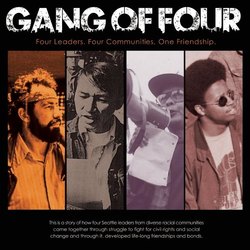Читать книгу The Gang of Four - Bob Santos - Страница 6
На сайте Литреса книга снята с продажи.
Оглавлениеlater years, was often. Much of our conversations were socially directed, or ‘mis-directed’ might I say, with much teasing between Bernie and Roberto or Roberto and me. And we all liked to ‘mess’ with a gullible Larry.
The bond that we shared was unique. We realized, as time went on, that our shared vision and collective influence needed to be preserved. Soon after Bernie passed away in 2000, Roberto, Larry, and I decided that because our relationship was so unique and potentially inspiring to others, we should document our collective experiences.
Each of us contributed to the development of this book. Roberto was interviewed and shared his insights before he passed away. with the assistance of Estela Ortega, Roberto Maestas’ wife, and Lawney Reyes provided childhood stories of his brother, Bernie Whitebear, through his two books about Bernie, “Bernie Whitebear: An Urban Indian’s Quest for Justice” and “White Grizzly Bear’s Legacy: Learning to be Indian.”
Indeed, working on this book was a labor of love.
Gary Iwamoto is a life-long resident of Seattle graduating from Franklin High School, and earning degrees in communications and law from the University of Washington.
Gary became active in the local Asian community soon after he graduated.
He was a member of the coram nobis legal team, which worked to successfully overturn the World War II convictions of Gordon Hirabayashi, who defied a military curfew and internment order.
He was a member of the legal team which held the Philippine’s Ferdinand Marcos regime responsible for the murders of Seattle political activists Gene Viernes and Silme Domingo in 1981.
Gary is a contributing writer for the International Examiner, a local community newspaper. He has written plays produced by the Northwest Asian American Theatre and has written skits for the Gang of Four, which they performed at the Northwest Asian American Theatre’s Community Show Off.
Gary co-authored with Bob Santos, Hum Bows, Not Hot Dogs, a memoir of Bob Santos’ life, in 2002.
While this book is written in a “third person” voice, it was taken from the individuals’ direct experiences. To write this story, Gary relied on several sources of information over an extended period of time. Larry Gossett, Bob Santos, and Roberto Maestas were interviewed together for several sessions and each were interviewed separately as well as provided written responses to interview questions.
Lawney Reyes provided childhood stories of his brother, Bernie Whitebear, through his two books about Bernie, “Bernie Whitebear: An Urban Indian’s Quest for Justice” and “White Grizzly Bear’s Legacy:
Learning to be Indian.”
Gary also obtained many newspaper accounts of the historical events that are featured in the book.
iii
